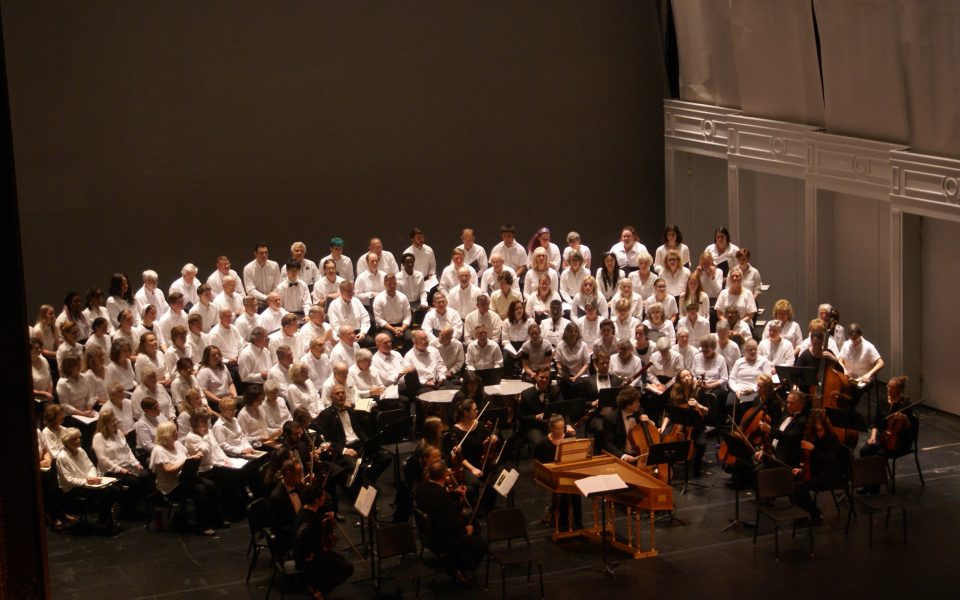Eighty-seven
years ago, the Mozart Club of Winston-Salem first undertook the challenge of
George Frederic Handel’s Messiah.
A
small group raised their voices and instruments for the first third of the
classical work, famously dubbed “The Christmas Portion.”
Now,
the Mozart Club fills the stage of RJ Reynolds Auditorium in rows upon rows of
seats. An expert orchestra and extensive chorus, along with four soloists,
bring the full three-part, two-and-a-half-hour oratorio to life. The
performance continues to be one of the longest-running musical traditions in
Winston-Salem, connecting almost a century of artists to one other.
Nancy
Ann Harris Greenfield and her husband, Alfred Greenfield oversaw Messiah for decades, seeing the piece
through about 70 years of presentations until Nancy’s passing in 2006. The
Mozart Club once held other shows throughout the year, however it is now only
known for their interpretations of Handel’s work.
Messiah offers several things for both the
musicians and audience members who pack both floors of the auditorium.
Celebrating the Christmas season can bring the music’s religious connotation to
the forefront, but many people come to the show or even offer up their voices
and instruments without any connection to Christianity. Classical fans come for
the piece’s place in musical canon, or the history of the work, while those who
appreciate local history enjoy its status as a Winston-Salem tradition.
Greg
Powers, chairman of the Mozart Club, and successor to Nancy Greenfield, stands
outside of the auditorium, shaking hands and greeting instrumentalists and
choir members as they carry their gear from the band room to the stage or take
a break from vocal warm-ups. With 13 years of experience as chairman, Powers can
recognize new faces in the crowd of musicians, and name those who return year
after year.
Keeping
the tradition, Powers believes, requires a bit of change every so often.
Through new conductors and interpretations, changing out soloists and the
general rotation of chorus members, each year feels different enough to keep it
familiar, yet fresh.
“It’s
alive,” Powers says. “It’s not just notes on a sheet of paper.”
In
the third part of Messiah, countertenor Mason Taylor stands from his
seat at the front of the stage and sings out, joined by tenor Jacob Wright in a
short work titled “O Death, Where is Thy Sting?” The two soloists belt their
notes together, light tones grounded by Wright’s deeper voice. The two soloists
harmonize in one of the few duets in the show. This marks the third time Taylor
takes the stage with his title.
“You’re
being a part of something bigger than yourself,” Taylor says.
Taylor,
along with the other soloists all at one point have learned from James
Allbritten, general director of the Piedmont Opera and conductor for this and
past year’s events. Allbritten himself took up the role after tutelage from Tom
Dunn, who guided the Mozart Club’s events in the 1960s.
“It
would tickle him to no end to know I’ve been doing this for so long,” he says.
A
closer look at the Mozart Club’s century of rosters reveals generations of
members. Like in Allbritten’s case, students find themselves in the roles their
teachers once held. Parents and grandparents vacate their spots in the chorus
or orchestra, only for their children or grandchildren to take their place.
Allbritten recalls meeting a performer during one year’s rehearsals who inherited the sheet music of Messiah from a family member who once returned to the Mozart Club each year. Flipping through the pages, he found name after name in the margins, signatures from every new conductor who walked on stage to lead the group. “I found Tom Dunn’s signature,” Allbritten says. “And I signed right under his.”
To learn more about the Mozart Club, visit wsmessiah.org.
Join the First Amendment Society, a membership that goes directly to funding TCB‘s newsroom.
We believe that reporting can save the world.
The TCB First Amendment Society recognizes the vital role of a free, unfettered press with a bundling of local experiences designed to build community, and unique engagements with our newsroom that will help you understand, and shape, local journalism’s critical role in uplifting the people in our cities.
All revenue goes directly into the newsroom as reporters’ salaries and freelance commissions.


Leave a Reply